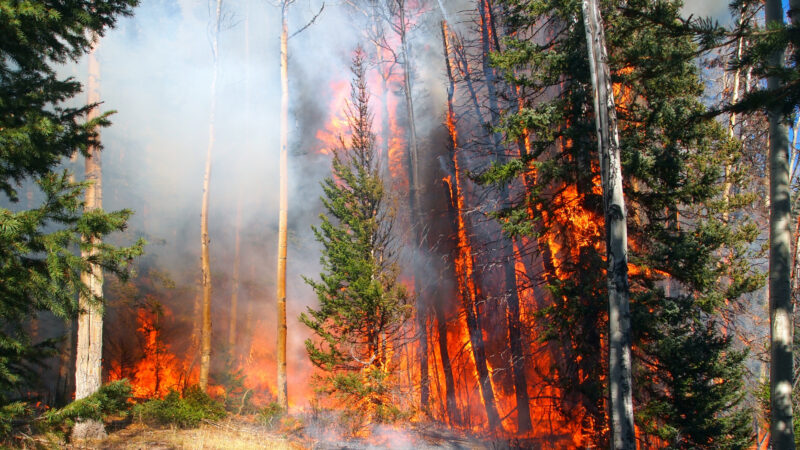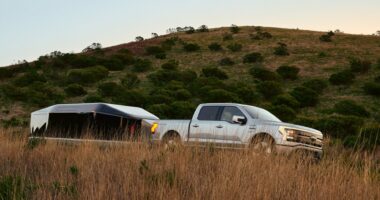Table of Contents Show
Camping in an RV during wildfire season can prove risky. You never know when or where these disasters will occur. However, don’t let the fear of them happening stop you from spending time in nature.
If your plans involve traveling through dry areas, listen up. Today, we’re sharing valuable tips to help you stay safe while RVing during wildfires. Let’s dig into this fiery topic!
What Is a Wildfire?
A wildfire is an uncontrolled fire that spreads quickly, primarily through forests and grasslands. The size and intensity factor significantly into the destructive force of these disasters. They can consume vegetation, dwellings, and anything else in their path.
Various things can lead to their creation, and they can be challenging to extinguish once they ignite. The weather plays a significant role in helping firefighters battle the flames.
Wind speed, temperatures, and humidity can make or break the situation. In addition, a good rain shower can give workers the upper hand.
The aftermath of these events can be seen for years to come. They change the landscape, and surviving trees often wear scars from the blaze. To avoid a wildfire situation, officials try to make the public aware of fire safety and regulations.
When Is Wildfire Season?
Given the right circumstances and conditions, wildfires can occur at any time of year. However, they occur most commonly during the summer and early fall.
These seasons tend to be when areas across the country experience less rainfall. Wildfire dangers increase the longer an area goes without rain.
As most of us know, Mother Nature can do some funky things. Temperatures and weather patterns can be challenging to predict. Stay aware of the weather and avoid any risky behavior regarding fires during dry conditions. You don’t want to be responsible for starting the next wildfire or the damage that comes with it.
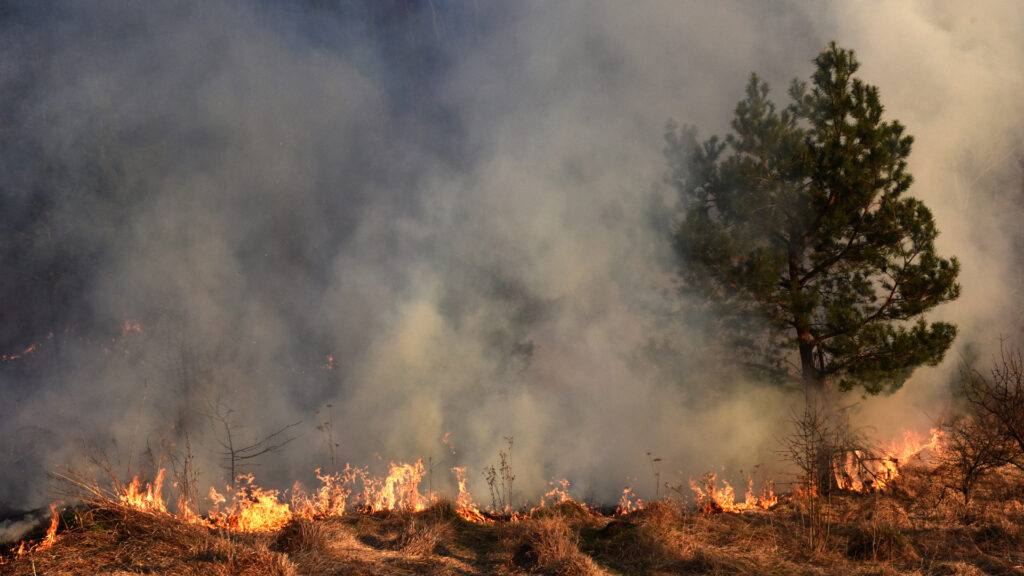
Which State Has the Most Wildfires?
If you want to avoid wildfire season, stay away from California. In 2021, the Golden State had approximately 9,000 wildfires, consuming over two million acres. This almost doubles that of Texas, which had the second most.
As mentioned earlier, wildfires can occur anytime under the right conditions. Other areas that often battle wildfires include Oregon, Washington, and many southwest states.
How Do Wildfires Get Started?
Since wildfires have occurred for thousands of years, we know how they start. While some occur naturally, that’s unfortunately not always the case.
Natural Causes
Under the right conditions, wildfires can spark from various natural causes. Things like lightning strikes and volcanic activity can ignite any dry vegetation. A dry field or a thick forest of downed trees provides the perfect fuel for a wildfire.
While these natural events can spark anywhere, landowners can do their part to minimize risks. Clearing limbs and debris from the ground can help reduce fuel. Burning these items during approved times prevents them from piling up and feeding a fire down the road.
Campfires and Outdoor Burning
In the words of the famous Smokey Bear, “Only you can prevent wildfires.” Unfortunately, we often hear about outdoor enthusiasts not following fire safety while camping, especially during wildfire season.
We’ve arrived at campsites and discovered campfires still hot from those using the site before us. The piping hot coals sat glowing and unattended for hours until we arrived.
People often create fires to dispose of limbs and other vegetation around their property. Unfortunately, these flames can get out of hand quickly in the right conditions. Before you know it, you’ll be on the phone with 911 calling for firefighters to help.
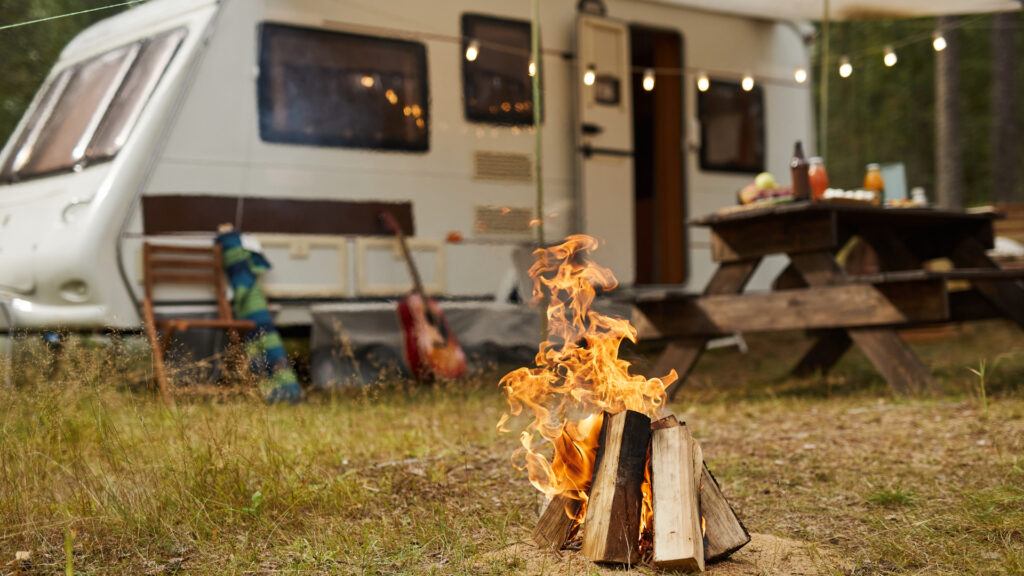
Arson
One of the most disgusting actions that lead to wildfires is arson. This happens when an individual intentionally creates a fire with the intent of causing harm or danger. Roughly 8% to 10% of the wildfires in California result from arson.
There are experts trained to investigate the cause of a wildfire. They take it seriously when they discover that a fire resulted from arson. Authorities investigate and prosecute those responsible.
However, no fine or jail sentence can bring back the plants, animals, or property that often get lost in these events.
Equipment Use
Many people overlook that fires can result from the equipment they use. Items like power tools, machinery, and even automobiles have the potential to ignite wildfires.
Chainsaws, welding equipment, and grinders throw enough sparks to ignite dry grass and other vegetation. Farm equipment hitting rocks can also generate a spark and cause a wildfire.
Many areas require drivers to avoid parking vehicles on the grass during extremely dry conditions. You’ll also see digital signs reminding drivers towing trailers to watch their chains. Sparks and heat from these items can lead to flames.
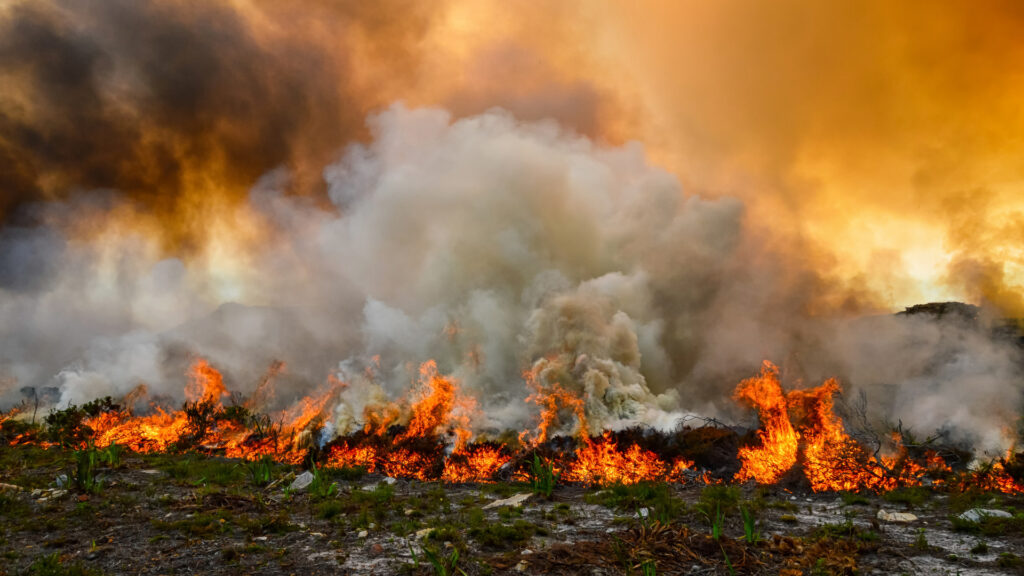
How to Prepare for Wildfire Season in Your RV
You need to do all that you can to avoid starting a wildfire. However, you also need to be ready in case one does occur. Here are some tips for preparing for wildfire season in your RV.
Plan Your Route and Destinations
Plan your route and destinations accordingly if you don’t want to worry about wildfires. As mentioned earlier, some states experience wildfires much more frequently than others. States like California, Oregon, Washington, Arizona, New Mexico, and Texas experience severely dry conditions.
Whether you’re planning a short or extended trip, you may need to adjust your route or destination if conditions in a particular area do not improve. One characteristic that RVers must develop is the ability to be flexible.
Have an Evacuation Plan
If there’s a chance that wildfire season will interrupt your RV adventures, you need an evacuation plan. You want to be able to escape as quickly as possible. We recommend using the available information to decide when to leave and where you’ll go.
Unfortunately, roads often close or have limited access during these emergencies. If you’re in a massive RV, this may make it difficult to make your escape. We recommend leaving the area long before the chaos erupts.
Stay Aware of the Situation
Being ignorant of the situation isn’t going to change or minimize the dangers. You need to stay tuned in to the news and any communications from officials regarding the wildfire.
During these events, rescuers typically set up a headquarters and provide frequent updates regarding the status.
When possible, they’ll typically provide plenty of notice of any potential evacuation orders that might be coming. You can receive the most up-to-date information on your phone through text alerts and social media.
However, with so much disinformation during these events, ensure the information about wildfire season comes from a reputable source.
Keep in Mind: We love sitting around a campfire, but hate that the smell stays in our hair! But these helpful tips will get the campfire smoke smell right out of your hair.
Pack an Emergency Kit
You want to have an emergency kit during any emergency, including wildfire season.
This will include basic first aid supplies, non-perishable foods and water, extra clothing, blankets, and personal documents. Items like flashlights, batteries, and tools should be stored in your camper, even when there’s not an emergency.
Don’t forget to consider important things like prescription medications. If you need them to survive, get a refill before it’s too late. You don’t want to run out during an emergency and have an even more severe situation on your hands.
Practice Fire Safety
We encourage you to always practice fire safety, especially during wildfire season. If you start a campfire, place it in a fire ring and a safe location. Clear the area and remove any dry leaves, grass, or other debris. Avoid making the fire larger than needed.
You should never leave a campfire unattended. An unattended fire can quickly grow out of control. When finished, drown the flames with water and stir the ashes. You want to ensure no embers remain to prevent it from spreading.
Follow Burn Bans
We get it; burn bans aren’t convenient for anyone. However, the destructive force of wildfires is even more inconvenient, especially when it threatens lives and property. Even if you disagree with them, you must follow them.
Burn bans can have various levels depending on the severity of the situation. Some will allow outdoor grilling or fires from propane, and others will not. Respecting the restrictions during wildfire season protects yourself and others, including nature.
Keep in Mind: Don’t cancel your travel plans if you don’t have anyone to go with on a cross-country roadtrip! Check out these Safety Tips for Solo RV Travel
Don’t Ignore Evacuation Orders
If officials tell you to leave, do it. Ignoring an evacuation puts yourself and firefighters in danger.
Officials order evacuations only when they believe it is essential to do so. Staying aware can give you time to devise a plan so you know what to do once you receive the order.
Since RVs are large and difficult to navigate, we recommend leaving quickly. Maneuvering a massive vehicle proves difficult enough, but doing it during an evacuation order is even more stressful. Do yourself and rescuers a favor and follow evacuation orders.
Stay Safe While RVing During Wildfire Season
As you can see, staying safe while RVing during wildfire season requires some proactive preparation.
Having an emergency kit, staying informed, and leaving an area when necessary can help you avoid a disaster. Ignoring the advice of experts puts yourself in harm’s way. Unfortunately, an RV stands no chance against a raging wildfire.
What do you do to prepare for wildfire season?




